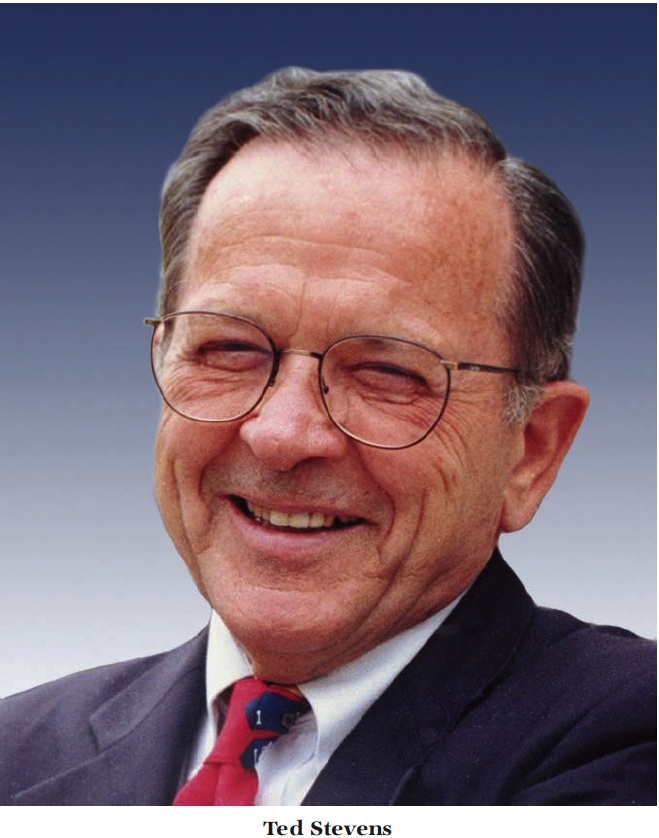Alaskan Senator’s Telecom Legacy Extends Beyond Fateful ‘Series of Tubes’ Comment
SAN FRANCISCO, August 11, 2010 – One of the more unfortunate pop-cultural legacies of Ted Stevens as far as telecommunications policy is concerned is his 2006 comment that the internet is like “a series of tubes.”
SAN FRANCISCO, August 11, 2010 – One of the more unfortunate pop-cultural legacies of Ted Stevens as far as telecommunications policy is concerned is his 2006 comment that the internet is like “a series of tubes.”
Plug the late Republican Alaskan senator’s name into Google, and the third item is a Wikipedia entry and a Daily Show segment on the incident.
It’s unfortunate because Stevens, who was 83 at the time that he made those comments, slogged through many other complex telecommunications issues during his tenure as chairman of the Senate Commerce Committee during the 109th Congress between 2005 and 2007, and then as its ranking member.
He often was not particularly eloquent about the technology issues involved, but along with his Democratic counterpart Hawaii Senator Daniel Inouye, he worked on legislative efforts to promote competition, such as a number portability bill in 2007.
Stevens made the ‘series of tubes’ comment during committee hearings over a mammoth telecom reform bill in the summer of 2006. His comments were directed at the issue of Net Neutrality, the concept of maintaining the original best efforts nature of the public internet, an issue still very much in the headlines as Google and Verizon try to sell their vision of what it should look like. Stevens was against the idea of including language in the legislation to mandate net neutrality.
“I know he’s known online for the ‘Series of Tubes’ video, but what’s often lost is that he was on the internet long before anyone else in Congress was,” said Earl Comstock, CEO of Comstock Consulting, and former President and CEO of competitive local exchange carrier association Comptel.
Comstock was Stevens’ legislative director for a decade between 1987 and 1997. His areas of focus were telecommunications and fishing issues.
“He was one of the authors of the laws on spectrum that enables the mobile broadband internet today,” noted Comstock in an interview.
Stevens, the longest-serving Republican in the senate, died in a plane crash Monday night on his way to a remote fishing lodge in Southwestern Alaska. The plane was owned by Alaska’s largest cable and telecommunications company GCI.
“This accident claimed the lives of Alaska’s great champion, Senator Ted Stevens, and other individuals who distinguished themselves through public and private service to this state and our nation. I want to express the profound sorrow felt at GCI over the loss of such good friends,” GCI President and CEO Ron Duncan said in a Tuesday statement.
As chairman of the 109th Congress’ Senate Commerce Committee and then as its ranking member, Stevens also worked on digital television transition issues, broadband roll-out to rural areas and other telecommunications competition issues. That was just a short, relatively recent stint in a long, passionate career in the senate that began in 1968.
It all ended in controversy in 2009 after colleagues from both sides of the aisle called for his resignation in the wake of charges of corruption. He ended up losing his senate seat to Democrat Mark Begich. But his corruption conviction was later thrown out due to discoveries about misconduct by the prosecutors.
On Tuesday, Stevens was remembered in the telecom world for his work on rural issues.
“Senator Stevens always fought for equal access for rural Americans – from equal access to communications, to equal access to transportation and infrastructure. He was a champion of rural America – whether you were a rural West Virginian or a rural Alaskan,” said the current Commerce Committee’s Chairman, Democrat Jay Rockefeller of West Virginia in a Tuesday statement.
For its part, the Independent Telephone and Telecommunications Alliance issued the following statement: “Senator Stevens was a staunch advocate for rural America throughout his historic 41-year Senate career, and advocated tirelessly on behalf of citizens in rural and insular areas throughout the United States. His commitment to telecommunications policy, complemented by his insight, vision, and stature in the Senate, enabled communications connectivity for millions of Americans, and stand as a particular achievement among his many good works.”
Another long-serving senator, Democrat Pat Leahy of Vermont, remembered Stevens this way: “He was a tough negotiator and a savvy legislator. But as I told him again last month, he was an old-school senator. He always kept his word to me and to other senators. In moments of legislative battle he would come onto the floor wearing his Hulk tie, and he would growl and act like a bulldog. But then he would spot friends on the floor and give a wink and a grin.”









Member discussion